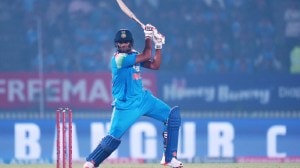Koirala8217;s coup
Three days after his resignation, G.P. Koirala emerged as a more acceptable Prime Minister than before with a two-third majority backing ...

Three days after his resignation, G.P. Koirala emerged as a more acceptable Prime Minister than before with a two-third majority backing him in Nepal8217;s 205-member House of Representatives.
The Resignation was only an indicator of Koirala8217;s manipulative skills after King Birendra turned down a cabinet recommendation to dissolve the House and hold elections with Koirala as the caretaker Prime Minister.
The King8217;s refusal to sign on the dotted line, the first time ever since he became a constitutional monarch eight years ago, also made it obligatory for Koirala to face a vote of confidence in the House.
This also meant a handover the government to any other likely group of individuals or parties, not necessarily based on principles, for the remaining 10 months of the present parliament in the event of losing the vote. But Koirala8217;s resignation, and his reappointment with a new team has made the King8217;s instruction totally infructuous. Koirala roped in the main opposition Communist Party as a key constituentof the new government. As required under Nepal8217;s constitution, the coalition government is expected to seek a vote of confidence in the House next week.
The two main constituents of the new government under Koirala 8212; the Nepali Congress and Communist Party 8212; have differences on policy, mainly on the nature of relations with India as well as on the way to deal with the Maoist rebels with their avowed objective to abolish the constitutional Monarchy among other things.
The Nepali Congress gives police a free hand to continue with its ongoing operation to annihilate the suspected Maoists while the communists oppose it.
Yet, the present arrangement, says a Congress executive committee member, has been arrived at just for one purpose: to hold general elections and allow a more stable political setup to govern the country.
The day after the new government wins the vote of confidence, the cabinet will place before the King a fresh recommendation to dissolve parliament and hold elections by the firsthalf of April. The King8217;s decision to reject Koirala8217;s recommendation earlier was, it seems influenced by a three-year old Supreme Court judgement which not only put restrictions on the cabinet8217;s right to recommend dissolution of the House, but also made it mandatory for the King to exhaust all possibilities of forming an alternative government. As a result, horse-trading, unprincipled alliances and floor-crossing have become rampant in Nepal with a hung parliament witnessing change of Prime Minister six times in the past four years.
This judgement, says eminent jurist Ganeshraj Sharma, is limited in scope. He says there is another judgement given earlier, but by a much larger bench that recognises a cabinet or Prime Minister8217;s right to dissolve the House even prematurely. While the King8217;s refusal to go by the cabinet8217;s recommendation might create more problems in future, as it disturbs the balance of power among various constitutional wings, next week8217;s likely recommendation of the cabinet for freshelections is something the King may not find easy to reject.
The present coalition and its outside supporters have more than two-third majority. Its only opposition in parliament as of now comes from a 40-member Communist splinter group 8212; rechristened Communist Party of Nepal-Marxist Leninist 8212; which pulled out of the Koirala government two weeks ago reducing it into a minority.
CPN-ML had accused Koirala of not honouring the 25-point secret agreement they had signed four months ago which they called the basis of power-sharing. Those, according to CPN-ML sources, included Koirala8217;s failure to check price rise and stop the killing of Maoist rebels, besides taking a nationalist posture8217; on dispute with India over the Kalapani border in western Nepal.
Koirala, who is also president of the Nepali Congress party, seems personally keen for election as his party8217;s prospect took brighter than two main opposition parties 8212; Communists and the Rashtrya Prajatantra Party RPP 8212; both of which have split in thepast two years.
Nepal8217;s political instability has also been marked by a series of scandals. Major major donors like Japan and Britain have commented freely about them and have asserted that the flow of further assistance would depend on improvement in the situation.
The March-April general election, the third in eight years, may give a relatively stable government. But there is no guarantee that it will not slip into power games that one of the poorest countries on earth cannot afford.
Yubaraj Ghimire is with BBC, London
- 01
- 02
- 03
- 04
- 05































